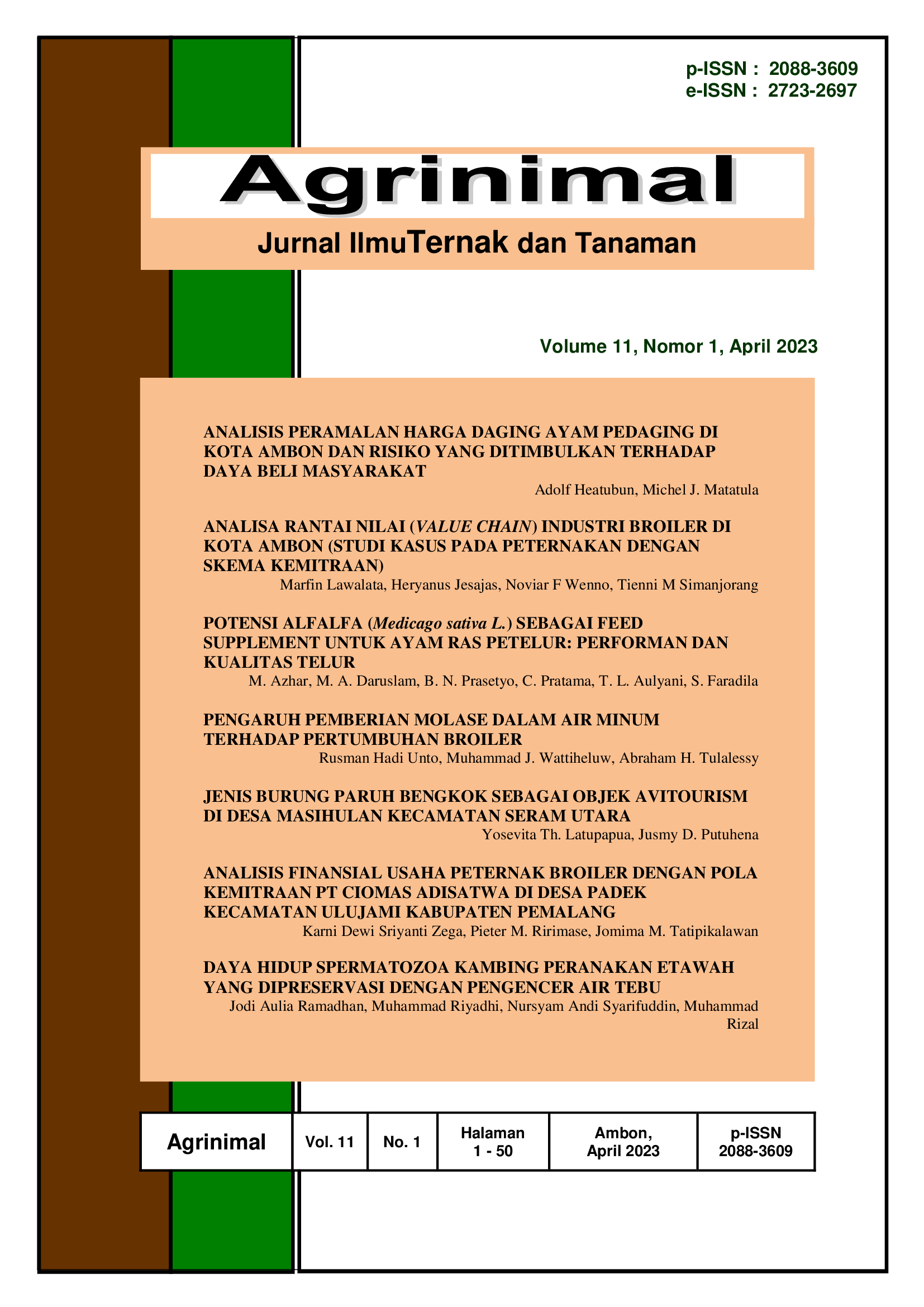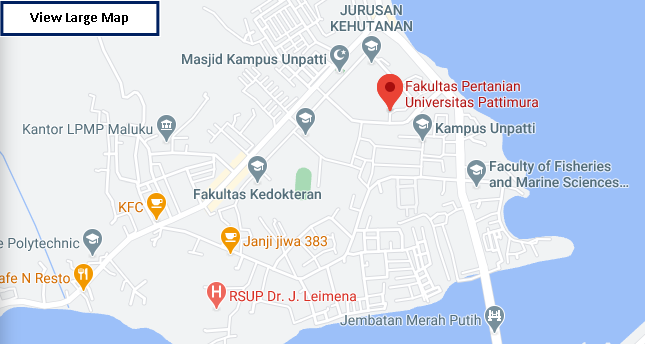POTENSI ALFALFA (Medicago sativa L.) SEBAGAI FEED SUPPLEMENT UNTUK AYAM RAS PETELUR: PERFORMAN DAN KUALITAS TELUR
POTENTIAL OF ALFALFA (Medicago sativa L.) AS A FEED SUPPLEMENT FOR LAYING HENS: PERFORMANCE AND EGG QUALITY
Abstract
Ayam ras petelur pada fase produksi memiliki dua masalah utama yaitu penurunan performa dan kualitas telur. Kondisi tersebut dapat diatasi dengan pemberian alfalfa sebagai feed supplement melalui air minum. Penelitian ini bertujuan untuk mengetahui potensi alfalfa sebagai feed supplement terhadap performa dan kualitas telur ayam ras petelur. Sebanyak 16 ekor ayam ayam ras petelur strain Hy-Line Brown umur 40 minggu ditempatkan secara individu pada kadang cages ukuran 30 x 30 x 40 cm. Pemberian pakan dilakukan 2 kali sehari pada pukul 06:00 dan pukul 14:00 dengan jumlah 115 g/ekor/hari, sedangkan air minum diberikan secara ad libitum. Aplikasi pemberian feed supplement alfalfa dikelompokkan menjadi 4 perlakuan berdasarkan Rancangan Acak Lengkap (RAL). Perlakuan pertama tanpa pemberian alfalfa (kontrol), perlakuan ke-2 yaitu alfalfa 3% (3 g bubuk alfalfa dilarutkan dalam 100 ml akuades), perlakuan ke-3 yaitu alfalfa 6% (6 g bubuk alfalfa dilarutkan dalam 100 ml akuades), dan perlakuan ke-4 yaitu alfalfa 9% (9 g bubuk alfalfa dilarutkan dalam 100 ml akuades). Alfalfa yang telah dilarutkan kemudian disaring dan dimasukkan ke dalam botol ukur 200 ml yang dimodifikasi dengan tutup menggunakan nipple dringker. Hasil penelitian menunjukkan bahwa pemberian feed supplement alfalfa meningkatkan produksi telur, namun konsumsi air minum, konsumsi pakan, dan konvensi pakan tidak menunjukkan perbedaan antara perlakuan. Berat telur dan warna kuning telur mengalami peningkatan dengan pemberian feed supplement alfalfa. Kesimpulannya aplikasi feed supplement alfalfa 9% melalui air minum mampu meningkatkan produksi telur, berat telur dan warna kuning telur.ABSTRACT
Laying hens in the final phase of production has two main problems, namely a decrease in performance and egg quality. This condition can be overcome by giving alfalfa as a feed supplement through drinking water. This study aims to determine the potential of alfalfa as a feed supplement on the performance and egg quality of laying hens. A total of 16 laying hens of the Hy-Line Brown strain aged 40 weeks were placed individually in cages measuring 30 x 30 x 40 cm. Feeding was done 2 times a day at 06:00 and 14:00 with the amount of 115 g/bird/day, while drinking water was given ad libitum. Alfalfa feed supplement application was grouped into 4 treatments based on a completely randomized design (CRD). The first treatment was without alfalfa (control), the second treatment was 3% alfalfa (3 g of alfalfa powder dissolved in 100 ml of distilled water), the third treatment was 6% alfalfa (6 g of alfalfa powder dissolved in 100 ml of distilled water), and the 4th treatment was 9% alfalfa (9 g of alfalfa powder dissolved in 100 ml of distilled water). Alfalfa that has been dissolved is then filtered and put into a modified 200 ml measuring bottle with a lid using a nipple drinker. The results showed that alfalfa feed supplementation increased egg production, but drinking water consumption, feed consumption, and feed convention did not show any difference between treatments. Egg weight and yolk color increased with the alfalfa feed supplement. In conclusion, the application of a 9% alfalfa feed supplement through drinking water was able to increase egg production, egg weight, and egg yolk color.Downloads
References
Abou-Elkhair, R., Selim, S., & Hussein, E. (2018). Effect of supplementing layer hen diet with phytogenic feed additives on laying performance, egg quality, egg lipid peroxidation and blood biochemical constituents. Animal Nutrition, 4(4), 394–400. https://doi.org/10.1016/j.aninu.2018.05.009
Amiruddin, Agustina, L., & Jamilah, J. (2020). Konsumsi Pakan, Konversi Pakan Dan Produksi Telur Ayam Arab Yang Ditambahkan Tepung Daun Murbei Pada Pakan. Buletin Nutrisi Dan Makanan Ternak, 14(1), 43–51. https://doi.org/10.20956/bnmt.v14i1.10583
Azhar, M., Rahmawati, R., Sara, U., & Taufik, M. (2022). Respons Organ Saluran Pencernaan dan Morfologi Usus Halus Ayam Lokal dengan In-Ovo Feeding Menggunakan L-Arginine. Jurnal Ilmu Dan Industri Peternakan, 8(1), 1–10. https://doi.org/10.24252/jiip.v8i1.25667
Azhar, M., Sara, U., Rahadja, D. P., & Pakiding, W. (2019). Pengaruh In Ovo Feeding L-Arginine terhadap Konsumsi Pakan , Pertambahan Berat Badan , dan Konversi Pakan Ayam Kampung. Jurnal Peternakan Lokal. 1(2), 16–20.
Fauteux, M. C., Gervais, R., Rico, D. E., Lebeuf, Y., & Chouinard, P. Y. (2016). Production, composition, and oxidative stability of milk highly enriched in polyunsaturated fatty acids from dairy cows fed alfalfa protein concentrate or supplemental vitamin E. Journal of Dairy Science, 99(6), 4411–4426. https://doi.org/10.3168/jds.2015-10722
Grela, E. R., Knaga, S., Winiarska-Mieczan, A., & Zięba, G. (2020). Effects of dietary alfalfa protein concentrate supplementation on performance, egg quality, and fatty acid composition of raw, freeze-dried, and hard-boiled eggs from Polbar laying hens. Poultry Science, 99(4), 2256–2265. https://doi.org/10.1016/j.psj.2019.11.030
Heijmans, J., Duijster, M., Gerrits, W. J. J., Kemp, B., Kwakkel, R. P., & van den Brand, H. (2022). I Impact of growth curve and dietary energy-to-protein ratio of broiler breeders on egg quality and egg composition. Poultry Science, 101(7), 101946. https://doi.org/10.1016/j.psj.2022.101946
Mattioli, S., Dal Bosco, A., Martino, M., Ruggeri, S., Marconi, O., Sileoni, V., Falcinelli, B., Castellini, C., & Benincasa, P. (2016). Alfalfa and flax sprouts supplementation enriches the content of bioactive compounds and lowers the cholesterol in hen egg. Journal of Functional Foods, 22, 454–462. https://doi.org/10.1016/j.jff.2016.02.007
Muir, W. I., Akter, Y., Bruerton, K., & Groves, P. J. (2022). The influence of hen size and diet nutrient density in early lay on hen performance, egg quality, and hen health in late lay. Poultry Science, 101(10), 102041. https://doi.org/10.1016/j.psj.2022.102041
Natsir, W. N. I., Daruslam, M. A., & Azhar, M. (2020). Palatabilitas maggot sebagai pakan sumber protein untuk ternak unggas. Jurnal Agrisistem, Vol. 16, No. 1, 27-34.
Ortiz, D., Lawson, T., Jarrett, R., Ring, A., Scoles, K. L., Hoverman, L., Rocheford, E., Karcher, D. M., & Rocheford, T. (2021). Applied Research Note : “ The impact of orange corn in laying hen diets on yolk pigmentation and xanthophyll carotenoid concentrations on a percent inclusion rate basis .” Journal of Applied Poultry Research, 31(1), 100218. https://doi.org/10.1016/j.japr.2021.100218
Ortiz, D., Lawson, T., Jarrett, R., Ring, A., Scoles, K. L., Hoverman, L., Rocheford, E., Karcher, D. M., & Rocheford, T. (2019). Bioforti fi ed orange corn increases xanthophyll density and yolk pigmentation in egg yolks from laying hens. Poultry Science, 100(7), 101117. https://doi.org/10.1016/j.psj.2021.101117
Peng, M., Huang, T., Yang, Q., Peng, S., Jin, Y., & Wang, X. (2019). file:///D:/ZHAR/Artikel/Literatur/Alfalfa/1-s2.0-S0032579121001516-main.pdf. Poultry Science, 101(3), 101650. https://doi.org/10.1016/j.psj.2021.101650
Purwati, D., Djaelani, M. A., & Yuniwarti, E. Y. W. (2015). Indeks Kuning Telur (IKT), Haugh Unit (HU) dan Bobot Telur pada Berbagai Itik Lokal di Jawa Tengah. Jurnal Biologi, 4(2), 1–9.
Sharma, M. K., Dinh, T., & Adhikari, P. A. (2020). Production performance, egg quality, and small intestine histomorphology of the laying hens supplemented with phytogenic feed additive. Journal of Applied Poultry Research, 29(2), 362–371. https://doi.org/10.1016/j.japr.2019.12.001
Su, Y., Sun, X., Zhao, S., Hu, M., Li, D., Qi, S., Jiao, X., Sun, Y., Wang, C., Zhu, X., Li, Z., & Shi, Y. (2022). Dietary alfalfa powder supplementation improves growth and development, body health, and meat quality of Tibetan sheep. Food Chemistry, 396(July), 133709. https://doi.org/10.1016/j.foodchem.2022.133709
Tao, Y., Wang, T., Huang, C., Lai, C., Ling, Z., Zhou, Y., & Yong, Q. (2021). Production performance, egg quality, plasma biochemical constituents and lipid metabolites of aged laying hens supplemented with incomplete degradation products of galactomannan. Poultry Science, 100(8), 101296. https://doi.org/10.1016/j.psj.2021.101296
White, D., Adhikari, R., Wang, J., Chen, C., Lee, J. H., & Kim, W. K. (2021). Effects of dietary protein, energy and β-mannanase on laying performance, egg quality, and ileal amino acid digestibility in laying hens. Poultry Science, 100(9), 101312. https://doi.org/10.1016/j.psj.2021.101312
Zhai, H. X., Wang, J. P., Zhang, Q., Aureli, R., Tschambser, A., & Faruk, M. U. (2022). Evaluation of the efficacy of a novel phytase in short-term digestibility and long-term egg production studies with laying hens. Poultry Science, 101(6), 101894. https://doi.org/10.1016/j.psj.2022.101894
Zheng, M., Mao, P., Tian, X., Guo, Q., & Meng, L. (2019). Effects of dietary supplementation of alfalfa meal on growth performance, carcass characteristics, meat and egg quality, and intestinal microbiota in Beijing-you chicken. Poultry Science, 98(5), 2250–2259. https://doi.org/10.3382/ps/pey550.








